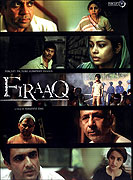Réalisation:
Nandita DasPhotographie:
Ravi K. ChandranActeurs·trices:
Nasser, Nawazuddin Siddiqui, Paresh Rawal, Shahana Goswami, Naseeruddin Shah, Raghuvir Yadav, Sanjay Suri, Masood Akhtar, Tisca Chopra (plus)Résumés(1)
A sensitive, searching hyperlink drama, actress Nandita Das's directorial debut Firaaq is set in the city of Ahmedabad, a month after the 2002 Gujarat riots. A young Muslim couple comes out of hiding to find their home reduced to ashes. A Hindu woman is wracked with guilt over her helplessness and negligence. After his store is looted, an unmarked, upper-class Muslim businessman suddenly feels too visible. An ageing musician oblivious to the tumult comes out of his shell. An orphaned child is repeatedly asked what his name is. Through interconnected narratives of common people affected by the events, the film examines the violent social, economic and spiritual fissures a metropolis undergoes in the aftermath of civil unrest. Firaaq is a story about survivors, but it is dotted with the spectres of missing persons who once oiled the machinery of the city. In its empathetic fictional retelling, Das's film lends flesh and blood to the kind of chilling testimonies we hear in Rakesh Sharma's Final Solution (2003). Foregrounding women's experience of the riots, it pays special attention to the way domestic spaces become vulnerable to violation, both physical and mental. Firaaq shows a city divided between those who can casually respond to knocks on the door and those who are gripped by mortal fear in doing so. (International Film Festival Rotterdam)
(plus)
